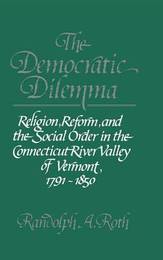
|
The Democratic Dilemma: Religion, Reform, and the Social Order in the Connecticut River Valley of Vermont, 1791-1850
Hardback
Main Details
| Title |
The Democratic Dilemma: Religion, Reform, and the Social Order in the Connecticut River Valley of Vermont, 1791-1850
|
| Authors and Contributors |
By (author) Randolph A. Roth
|
| Physical Properties |
| Format:Hardback | | Pages:410 | | Dimensions(mm): Height 229,Width 152 |
|
| Category/Genre | World history - c 1750 to c 1900 |
|---|
| ISBN/Barcode |
9780521301831
|
| Classifications | Dewey:974.3 |
|---|
| Audience | | Professional & Vocational | |
|---|
|
Publishing Details |
| Publisher |
Cambridge University Press
|
| Imprint |
Cambridge University Press
|
| Publication Date |
30 October 1987 |
| Publication Country |
United Kingdom
|
Description
The Democratic Dilemma seeks to explain Vermonters' extraordinary faith and idealism. It argues that Vermonters, as the most radical democrats of the Age of Revolution and conservators of New England's traditions, faced a dilemma: how to reconcile their commitment to competition, toleration, and popular sovereignty with their desire to defend an orderly and pious way of life. By embedding democratic ideals in their institutions and their society. Denominations and political parties clashed, townspeople and church members proved ungovernable, and young people grew wayward and rebellious. An economic and demographic crisis in the 1830s and 1840s compounded these problems by denying many inhabitants what they wanted most independent shops and farms for themselves and their descendants. None of these problems could he solved without restraining spiritual, political, and economic freedom and compromising the principles of Vermont's revolution.
Reviews"...Offers a solid analysis of early nineteenth-century Vermont as it adjusted to rapid social and economic change, and faced conflicts between democratic ideology and the inequalities produced by a competitive economy...Roth adds an important dimension to our understanding of the New England frontier, and the manner in which New Englanders bridged post-Revolutionary conflicts between democratic equality and economic competition." Jeffrey P. Brown, the Historian
|